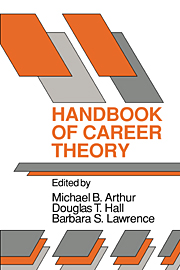Book contents
- Frontmatter
- Contents
- List of contributors
- Preface
- PART I CURRENT APPROACHES TO THE STUDY OF CAREERS
- Introduction to Part I
- 1 Generating new directions in career theory: the case for a transdisciplinary approach
- 2 Trait-factor theories: traditional cornerstone of career theory
- 3 Careers, identities, and institutions: the legacy of the Chicago School of Sociology
- 4 The utility of adult development theory in understanding career adjustment process
- 5 Developmental views of careers in organizations
- 6 Exploring women's development: implications for career theory, practice, and research
- 7 The influence of race on career dynamics: theory and research on minority career experiences
- 8 Asynchronism in dual-career and family linkages
- 9 Transitions, work histories, and careers
- 10 Career system profiles and strategic staffing
- PART II NEW IDEAS FOR THE STUDY OF CAREERS
- PART III FUTURE DIRECTIONS FOR THE DEVELOPMENT OF CAREER THEORY
- Name index
- Subject index
8 - Asynchronism in dual-career and family linkages
Published online by Cambridge University Press: 05 June 2012
- Frontmatter
- Contents
- List of contributors
- Preface
- PART I CURRENT APPROACHES TO THE STUDY OF CAREERS
- Introduction to Part I
- 1 Generating new directions in career theory: the case for a transdisciplinary approach
- 2 Trait-factor theories: traditional cornerstone of career theory
- 3 Careers, identities, and institutions: the legacy of the Chicago School of Sociology
- 4 The utility of adult development theory in understanding career adjustment process
- 5 Developmental views of careers in organizations
- 6 Exploring women's development: implications for career theory, practice, and research
- 7 The influence of race on career dynamics: theory and research on minority career experiences
- 8 Asynchronism in dual-career and family linkages
- 9 Transitions, work histories, and careers
- 10 Career system profiles and strategic staffing
- PART II NEW IDEAS FOR THE STUDY OF CAREERS
- PART III FUTURE DIRECTIONS FOR THE DEVELOPMENT OF CAREER THEORY
- Name index
- Subject index
Summary
INTRODUCTION: FAMILY IMPACT UPON WORK
For some time now, researchers have been taking a holistic approach to examining the career development of individuals, recognizing the fact that the work and nonwork lives of people are inexorably intertwined (see, e.g., Evans and Bartolome, 1984). The work-family linkages are so strong and pervasive that focusing on career development without simultaneously taking into consideration the family's developmental needs will produce an incomplete understanding of career dynamics. For instance, Bailyn (1978) pointed out the necessity for the accommodation of work to family concerns, and Kanter (1977) proposed a critical review and agenda for research and policy regarding work and family. Schein (1978) discussed the work–family–self interactions in exploring career dynamics, while Rapoport and Rapoport (1980) discussed the dynamics of work, family, and leisure. More recently, researchers have started to investigate the implications of dualcareer families for social policy (Walker, Rozee-Koher, and Wallston, 1987) and explored the dilemmas experienced by couples during career transitions (O'Neil, Fishman, and Kinsella-Shaw, 1987). Further, Hall and Hall (1979), Mathews (1984), Stringer–Moore (1981), Betz and Fitzgerald (1987), Hertz (1986), Grant (1988), and Sekaran (1986), among others, have proposed action steps for organizations to make the work–nonwork transitions smoother for dual–career couples.
In this chapter we employ a developmental perspective and explore the dynamics of the relationships between individual, the family, and the career. Only then can we begin to understand the life stages in which the spouses have a relatively easy time establishing the work–family–self linkages and the specific stages where they experience problems.
- Type
- Chapter
- Information
- Handbook of Career Theory , pp. 159 - 180Publisher: Cambridge University PressPrint publication year: 1989
- 43
- Cited by

